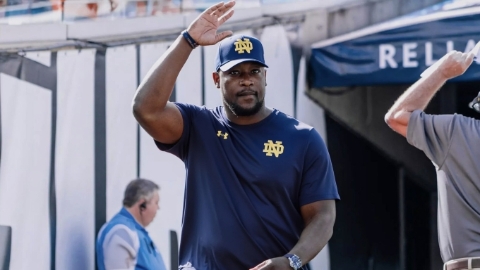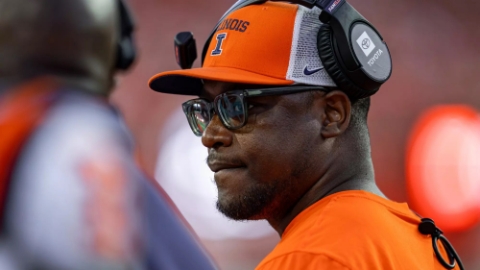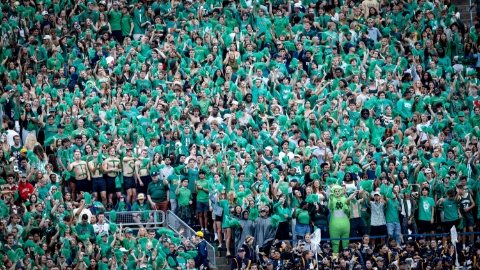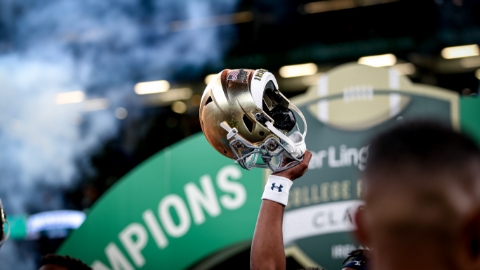Notre Dame AD Jack Swarbrick on Conference Realignment & College Football Playoff
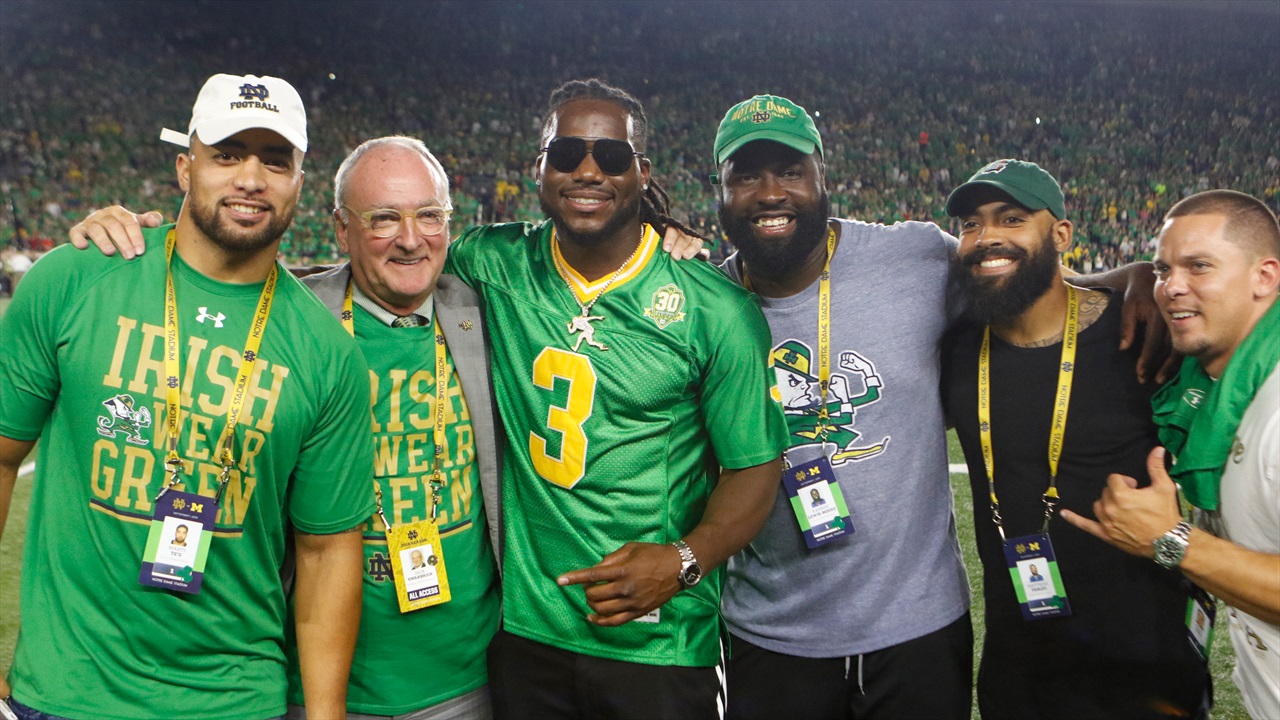
Notre Dame athletic director Jack Swarbrick spoke with Vice President of University Relations Lou Nanni on Wednesday morning on various topics surrounding Irish athletics and much more.
The latest happenings in conference realignment took up much of the discussion.
On conference affiliation following the latest movement across the country:
“The two big moves we've had in the past two years were, in a sense, foreseeable. A lot of us knew Texas was interested and considering what its options would be. A lot of us knew USC was a little frustrated with its situation.
"Those two dominoes you always felt were sort of potential movement. Now, did I see USC and UCLA going to the Big 10? No, not necessarily. The movement didn't surprise. Those are the big moves, the tectonic ones. They trigger other discussions and possibilities.
"I think what we've seen is the consolidation of power, if you will, into two conferences, the SEC and the Big 10. There's a bit of a big two, next level three and then group of five in a way there would be once the moves are completed.
"That's probably the biggest significance - the SEC and the Big 10 have, at least for now, put themselves in a different position."
On the chance of a third major conference forming out of the ACC, BIG 12 and PAC 12:
"There are a lot of complications in creating a third. The ACC is looking at a lot of options. The PAC 12 and BIG 12 have looked at every option. I think the notion of a consolidation would make some sense. I think it's really complicated to get to. Absent of some merger by the PAC 12 and the BIG 12, at least in the near term, it's unlikely.
"I think the advantage and it's an advantage that gets reinforced with their media deals, the advantage the SEC and the BIG 10 have built is probably going to be there for quite some time."
On the ramifications for Notre Dame in recent events in conference affiliation:
"I don't know if we're stronger, but it certainly has felt like a validation of our decision to be independent. So much of the commentary and stories have been what will Notre Dame do and discussing Notre Dame's significance and the importance of if we made a decision to do one thing or another.
"When I started this job, and I don't say that to take any credit for it, but all the commentary was if we were relevant anymore. This year, no one is asking that question. All this dynamic has just reinforced that a lot of the decisions that have been made over the years have placed Notre Dame in a very good position. That's my biggest takeaway."
On if Notre Dame is headed towards a college football super league of 60 schools:
"There are two different concepts there. As to a super league, it feels unlikely. It's just too complicated with contractual commitments, assignment of rights and a number of things.
"I think you'll have the SEC and the BIG 10 sort of carving out their own space. They will likely grow a little bit over time. I don't think there is anything imminent. It wouldn't surprise me to see both of those eventually wind up around 20.
"Maybe over a longer period of time there will be an emergence of a third (conference), which gets you to that number of 60.
"Separate of that is the issue of governance. There is a lot of discussion today of how football should be governed. What's the role of the NCAA? Should the College Football Playoff be the organization that does it? Should we create something new? Should more power shift to the conferences?
"There's a general view that something new has to take shape here to effectively govern football, which has a position now that any of us could have anticipated as recently as 10 years ago. Its dominance is extraordinary."
On what would trigger a move for Notre Dame to give up independence in football:
"We've talked about them a fair amount. One is do we have a committed broadcast partner, who not only will carry all our home games nationally, but will compensate us for our media rights in a way that allows us to be competitive. It starts with the question of media partner.
"Secondly is our access to the College Football Playoff. Do we as an independent retain adequate access? I think we've proved conclusively in the past eight years that we've had it. Both of those things will play out over time. I can't predict how much time.
"I think the CFP will be resolved as to what's next within that timeframe. It's possible the media situation could be, but the flipside to that is our contract runs through the '25 season. Hard to say.
"The third is a good home for our Olympic sports where they can compete for national championships, but also have schedules that make sense for that. The ACC has been a great partner for us in that regard. I'd like to make progress on the schedule front.
"It's so hard for our kids to travel the way they do. I think we've talked about it before, but when you're going to Tallahassee and you start with a bus trip to Midway and then you connect once along the way before you get there and then you're on a bus trying to get to campus, it's probably 18 or 16 hours that you've been involved in traveling. That's tough to be a pre-med major or finance major and do that. We're always looking for ways to make the scheduling easier.
"It's media, CFP and it's our Olympic sports."
On the impact of the B10’s media package:
“With the caveat that they haven't formally announced it - I think it's great for college football. They made a decision to have three linear broadcast partners in FOX, who will prinicably have the Big Noon game, CBS will have the 3:30 kick and NBC will have the primetime kick.
"The more broadcasters, major networks, we keep involved for college football, the better it is for everybody. They're invested, they want to promote the game and they want additional properties.
"I think it was a brilliant strategy by commissioner (Kevin) Warren and it played out marvelously for him. The timing couldn't have been better. When they finally announce the number, it will be a pretty amazing one.
"It's also perfect for Notre Dame. We need NBC to have more college football to more effectively promote our games and talk about our games and to have NBC be seen in that light. That was great for us that they got a big piece of this."
On an ideal number of teams for the College Football Playoff:
”I couldn’t be more invested in the model of 12 that we came forward with. I spent a lot of time building that with commissioner (Greg) Sankey, (Bob) Bowlsby and (Craig) Thompson. We spent 18 months on that plan. I think it’s the right number for a host of reasons.
“The calendar is so tough to accommodate. You get bigger than 12, the calendar gets even more complicated. Less than 12, you’re just not giving enough student-athletes the opportunity. The most compelling statistic for me when we started our research was that on average if you’re a college athlete, you have a 23 percent chance of participating in the postseason. If you’re a football player, you have a less than four percent chance.
“We need to give student-athletes who are football players more of an opportunity to be in the postseason.”
Notre Dame Fighting Irish 2022 Sideline Football Performance Cotton T-Shirt

